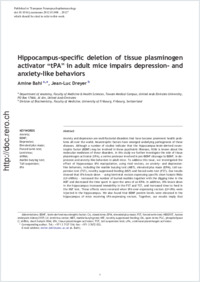Hippocampus-specific deletion of tissue plasminogen activator “tPA” in adult mice impairs depression- and anxiety-like behaviors
- Bahi, Amine Department of Anatomy, Faculty of Medicine, University of Fribourg, Switzerland - Health Sciences, Tawam Medical Campus, United Arab Emirates University
- Dreyer, Jean-Luc Division of Biochemistry, Faculty of Biology, University of Fribourg, Switzerland
-
28.02.2012
Published in:
- European Neuropsychopharmacology. - 2012, vol. 22, no. 9, p. 672-682
Anxiety
BDNF
Depression
Elevated plus maze
Forced swim test
Lentivirus
shRNA
Marble burying test
Tail suspension
tPA
English
Anxiety and depression are multifactorial disorders that have become prominent health problems all over the world. Neurotrophic factors have emerged underlying pathogenesis of these diseases. Although a number of studies indicate that the hippocampus-brain-derived neurotrophic factor (BDNF) may be involved in these psychiatric illnesses, little is known about the molecular mediators of these disorders. In this study we further investigate the role of tissue plasminogen activator (tPA), a serine protease involved in pro-BDNF cleavage to BDNF, in depression and anxiety-like behaviors in adult mice. To address this issue, we investigated the effect of hippocampus tPA manipulation, using viral vectors, on anxiety- and depression-like behaviors, including the marble burying test (MBT), elevated plus maze (EPM), tail suspension test (TST), novelty suppressed feeding (NSF) and forced swim test (FST). Our results showed that tPA knock-down – using lentiviral vectors expressing specific short hairpin RNAs (LV-shRNA) – increased the number of buried marbles together with the digging time in the MBT and decreased the time spent in open the arms of an EPM. In addition, tPA-knock down in the hippocampus increased immobility in the FST and TST, and increased time to feed in the NSF test. These effects were reversed when tPA-over-expressing vectors (LV-tPA) were injected in the hippocampus. We also found that BDNF protein levels were elevated in the hippocampus of mice receiving tPA-expressing vectors. Together, our results imply that tPA manipulation may provide an effective therapeutic intervention for depression and anxiety disorders.
- Faculty
- Faculté des sciences et de médecine
- Department
- Département de Médecine
- Language
-
- English
- Classification
- Biological sciences
- License
-
License undefined
- Identifiers
-
- RERO DOC 29071
- DOI 10.1016/j.euroneuro.2012.01.008
- Persistent URL
- https://folia.unifr.ch/unifr/documents/302320
Statistics
Document views: 135
File downloads:
- pdf: 235
